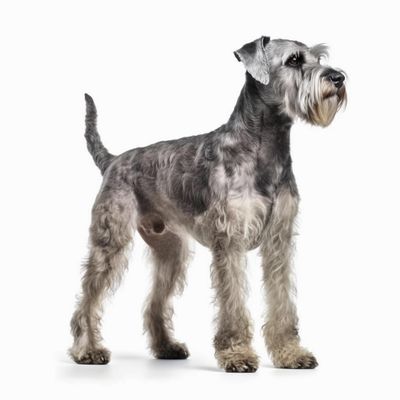Miniature Schnauzer - vs - Weimaraner - vs - Australian Shepherd

Miniature Schnauzers are small-sized dogs, weighing 11-20 lbs, with a height of 12-14 inches.
Miniature Schnauzers have a medium energy level and require regular exercise to stay happy and healthy.
Miniature Schnauzers need a moderate amount of exercise, including daily walks and interactive play sessions.
Miniature Schnauzers are intelligent and trainable but can be stubborn at times. Consistent, positive reinforcement is key.
Miniature Schnauzers are highly intelligent dogs and can excel in various dog sports and activities.
Miniature Schnauzers can adapt to a wide range of living situations, making them suitable for city or country living.
Miniature Schnauzers are generally good with children when properly socialized and can be energetic playmates.
Miniature Schnauzers can get along well with other pets, especially when raised together.
Miniature Schnauzers can tolerate colder temperatures, but they still need proper protection during extreme cold.
Miniature Schnauzers can tolerate hot climates, but they need to be monitored for signs of overheating during exercise.
Miniature Schnauzers have a low-shedding coat, making them a good choice for people with allergies.
Miniature Schnauzers require regular grooming, including brushing, bathing, and trimming to keep their coats clean and healthy.
Miniature Schnauzers tend to bark more frequently and may require consistent training to manage their barking.
Miniature Schnauzers are generally healthy, but regular veterinary checkups and preventative care are still necessary.

Weimaraners have a high energy level and need regular physical activity to stay happy and healthy.
Weimaraners require daily exercise, including walks, runs, and mentally stimulating activities like play and training.
Weimaraners are intelligent and eager to learn, making them highly trainable with consistent, positive reinforcement.
Weimaraners are intelligent dogs known for their versatility in various dog sports and activities.
Weimaraners can adapt to different living situations, but their high energy levels may make them less suited for small spaces like apartments.
Weimaraners can be good with children, but their size and energy levels may require supervision and proper handling.
Weimaraners can get along with other pets, but early socialization and training are essential. Their prey drive may require caution around smaller animals.
Weimaraners can tolerate colder temperatures, but their short coats may require extra protection during extreme cold.
Weimaraners can tolerate hot climates, but they need to be monitored for signs of overheating during exercise.
Weimaraners have a short coat and shed moderately, requiring regular grooming to keep their coats clean and healthy.
Weimaraners require minimal grooming, including occasional brushing and bathing.
Weimaraners have average bark tendencies and may bark for various reasons, such as alerting their owners or during playtime.
Weimaraners are generally healthy, but regular veterinary checkups and preventative care are still necessary.

Australian Shepherds are medium-sized dogs, standing 18-23 inches tall and weighing 40-65 lbs.
Australian Shepherds have high energy levels, requiring plenty of exercise and mental stimulation.
Australian Shepherds need lots of daily exercise, including walks, runs, and activities like agility, herding, or obedience training.
Australian Shepherds are intelligent and eager to learn, making them highly trainable with positive reinforcement and consistent training.
Australian Shepherds are highly intelligent and excel at problem-solving and learning new tasks.
Australian Shepherds are adaptable but thrive best in an active household with space to exercise and work.
Australian Shepherds can be good with children, especially when properly socialized and supervised.
Australian Shepherds generally get along well with other pets when properly socialized, although their herding instincts may cause them to chase or herd smaller animals.
Australian Shepherds have a double coat that provides insulation, allowing them to handle colder climates well.
Australian Shepherds can tolerate heat, but they should be provided with shade, water, and limited exercise during the hottest parts of the day.
Australian Shepherds have a double coat that sheds seasonally, requiring regular grooming to remove dead hair.
Australian Shepherds require regular grooming, including brushing at least once a week and more frequently during shedding seasons.
Australian Shepherds have average bark tendencies and may bark for various reasons, such as alerting their owners or during playtime.
Australian Shepherds may experience some health issues and require additional care and attention, such as regular veterinary checkups, preventative care, and potential medication or treatments.



